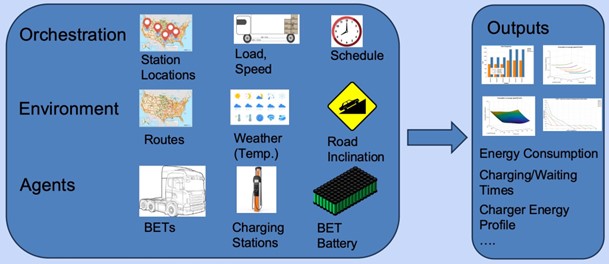Research Highlights
A Simulation Framework for Battery Electric Trucks Fleet Operations
Estimating Costs and Opportunities of the Electrification of the Freight Sector
September 04, 2025

The Science Objective
The trucking sector is a cornerstone of the U.S. economy, playing a critical role in enabling transportation of goods and commerce. At the same time, this sector is responsible for a large portion of the greenhouse gas emissions in the U.S. The recent introduction of battery electric trucks in the market offers an opportunity for reducing the greenhouse gas emissions of this sector by transitioning existing trucks with battery electric trucks. However, to realize such an opportunity, the associated costs must be accurately estimated. Such costs depend on multiple factors including ownership and operational costs, as well as risks associated with the state of the charging infrastructure. The objective of this project is to create a digital twin model that can be used to simulate different types of transportation fleets at a high level of granularity and estimate operational costs associated with battery electric trucks.
Approach
Our solution is a multi-layered agent-based digital twin model. At the core of the model, we build two types of agents, battery electric trucks and charging stations. The behavior of the battery electric trucks is modeled as a combination of the battery state of charge and traveling behavior. Specifically, we model the battery cycle behavior as a function of traveling speed, temperature, and weight. The charging stations are modeled as agents that can replenish the batteries up to their maximum state of charge. The environment layer provides inputs for environmental conditions, such as weather, temperature, and road networks. The orchestration layer captures fleet specific characteristics such as number of trucks, scheduling constraints, routing constraints, and operational parameters such as the load of the trucks.
The digital twin is implemented inside the Anylogic platform, which provides native support for several functions of agent-based systems.
Impact
- The model has been evaluated with multiple types of fleets with up to hundreds of trucks with different characteristics.
- The model has been evaluated with scenarios in multiple locations in the world at different granularities including Chicago, Illinois, USA, and UK.
- The model can produce multiple parameters in output including energy demand for trucks and fleets, energy profiles at charging stations.
- The model can provide an accurate estimate of delays at charging stations.
Summary
The electrification of the transportation sector can significantly reduce greenhouse gas emissions and contribute to combating climate change. To enable such transition an accurate estimate of operational costs is important. EVSim is a digital twin tool created to simulate fleets of battery electric trucks to estimate operational costs of battery electric truck fleets.
Team Members

Ameer Mustafa (Student)
UIC

Carolina Veiga (Postdoc)
DPI

Yiming Xu (Postdoc)
Cardiff University

Maurizio Albano (Advisor)
Cardiff University

Liana Cipcigan (Advisor)
Cardiff University

Rigel Gjomemo (Advisor)
UIC
Publications
A Multi-agent Simulation Model for Fleet Electrification. Ameer Mustafa, Carolina Veiga, Maurizio Albano, Liana Cipcigan, Omer Rana, Ashish Sharma, Rigel Gjomemo. Transportation Research Symposium. May 2025, Rotterdam, Netherlands.
Sign up for our mailing list
You’ll receive the latest updates on CLEETS research and programming.
